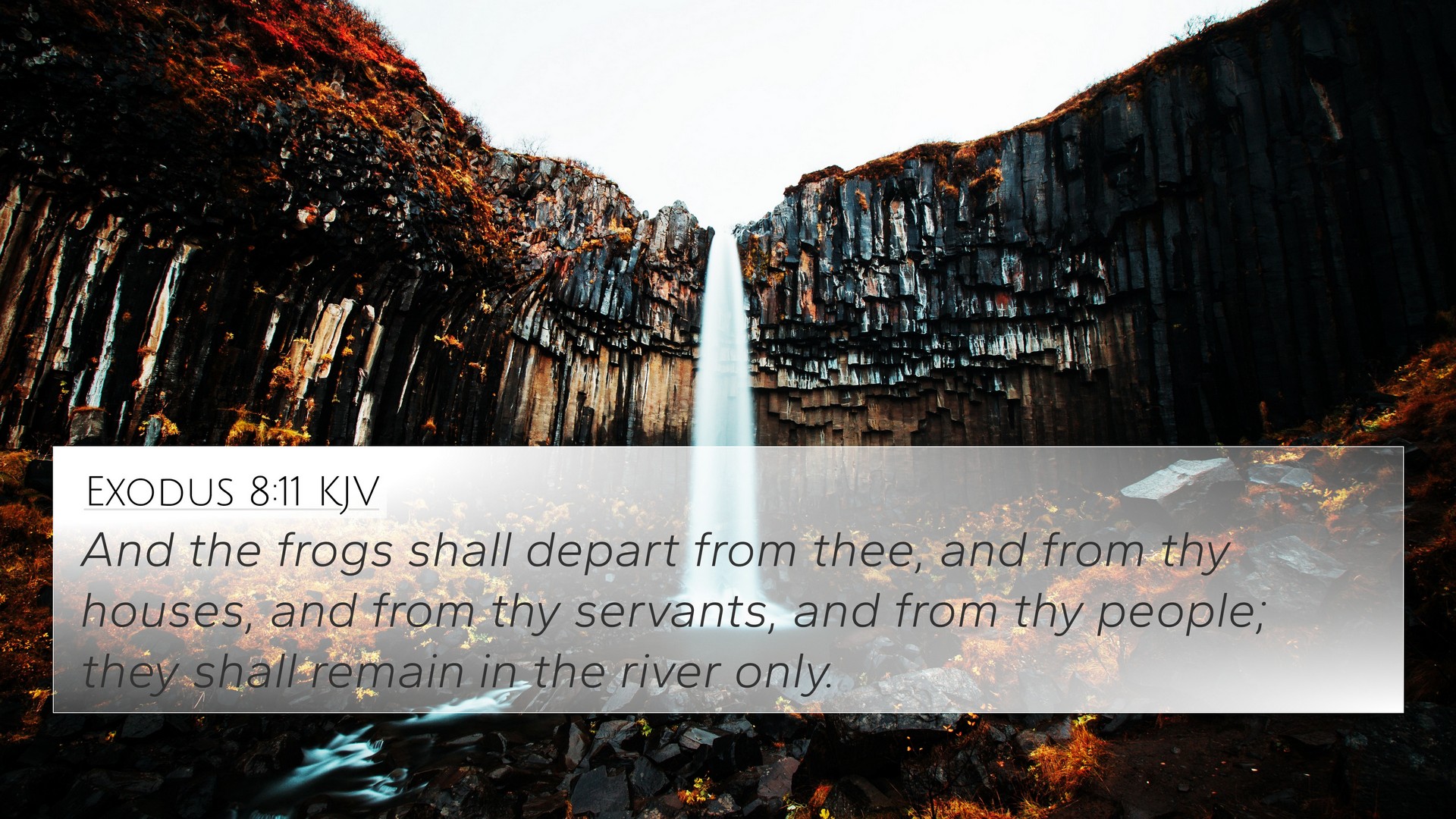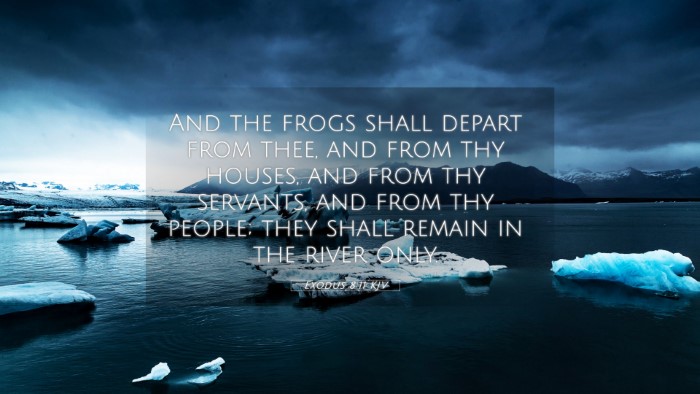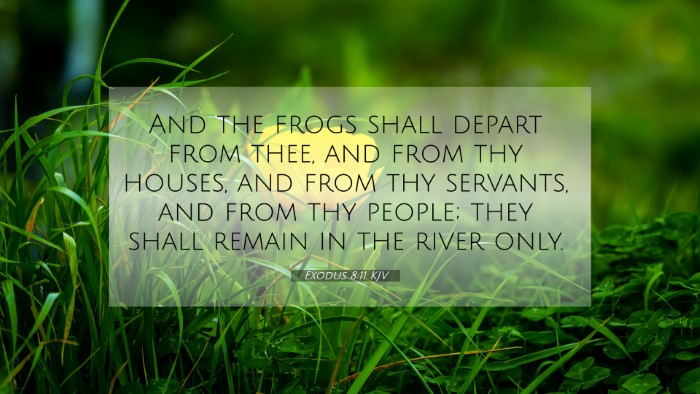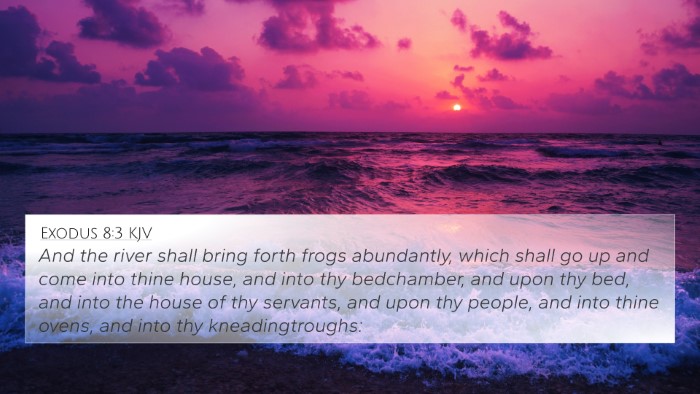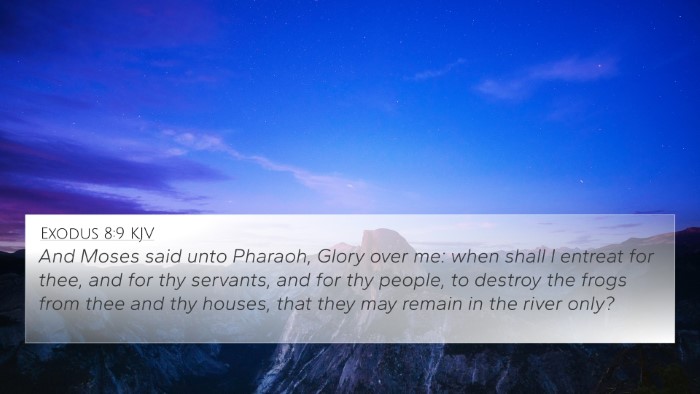Interpretation and Meaning of Exodus 8:11
Exodus 8:11 states:
"And the frogs shall depart from thee, and from thy houses, and from thy servants, and from thy people: they shall remain in the river only."
This verse occurs during one of the plagues inflicted upon Egypt, revealing God's power over creation and the hard-heartedness of Pharaoh. Here’s a comprehensive summary using insights from notable public domain commentaries.
Understanding Exodus 8:11
Exodus 8:11 marks the declaration regarding the plague of frogs, outlining when and how they shall leave the land of Egypt.
Key Themes
- Divine Authority: God is depicted as sovereign over nature, commanding the frogs to leave as a sign of His power (Matthew Henry).
- Pharaoh's Hardness of Heart: Despite witnessing the miracles, Pharaoh’s obstinacy leads him to negotiate terms instead of humbling himself before God (Albert Barnes).
- Judgment and Mercy: This verse illustrates a balance of God's judgment against Egypt while simultaneously offering a chance for repentance (Adam Clarke).
Exegesis and Context
The context of this verse is essential to understanding its meaning. It is part of a series of plagues sent by God to convince Pharaoh to release the Israelites from slavery. Each plague not only serves as a judgment against Egypt but also reveals the true nature of God to the Israelites and the Egyptians alike.
Connections to Other Scriptures
To grasp a fuller understanding, it’s beneficial to look at the overarching narrative and other relevant scripture references:
- Exodus 7:26: God initially commands Moses to summon the plagues against Pharaoh’s stubbornness.
- Exodus 8:1-4: The introduction of the plague and Pharaoh's initial refusal to heed God's command.
- Psalm 78:45: Reflects on the frogs as one of God's judgments against disobedience.
- Deuteronomy 28:27: References the multitude of plagues as consequences for disobedience.
- Romans 9:17: Paul cites Pharaoh's hard heart as an example of God's purpose and sovereignty.
- Matthew 10:14: Jesus speaks of shaking dust from sandals, alluding to judgment on unrepentant hearts, similar to those of Pharaoh.
- Revelation 16:13-14: Mentions frogs as symbols of unclean spirits, drawing connections to God's earlier plagues.
Thematic Bible Verse Connections
Many themes interweave through the Bible, emphasizing God’s judgment, human stubbornness, and the call to repentance:
- Judgment: Both the Old and New Testament depicts God's judgment over disobedience (e.g., Isaiah 26:21, Matthew 25:46).
- Repentance: Call to repentance seen in John's baptism (Mark 1:4) and throughout the Gospels.
- God's Sovereignty: A constant theme from Genesis to Revelation (e.g., Proverbs 19:21, Ephesians 1:11).
Cross-Referencing Biblical Texts
Utilizing tools for Bible cross-referencing can deepen one’s understanding of these connections:
- Bible Concordance: An indispensable tool for finding similar themes.
- Cross-Reference Bible Study: Helps in understanding the links between verses.
- Comprehensive Bible Cross-Reference Materials: These resources aid in developing a richer theological perspective.
Conclusion
Exodus 8:11 is not merely an isolated verse; it plays a crucial part in the larger narrative of the Exodus and God’s relentless pursuit of His people’s freedom. The themes of judgment, mercy, and the hardness of the human heart are continually explored throughout the Scriptures, showing how interconnected and deeply woven the biblical text is.
For anyone seeking deeper Bible verse interpretations, this verse highlights the importance of understanding cross-references within the Scripture, demonstrating the vast relationships between passages across the Old and New Testaments.
